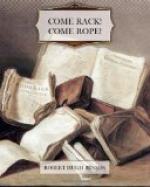The Queen herself was a mystery.
They had seen, for a moment, as she drove in after dark last September, a coach (in which, it was said, she had sat with her back to the horses) surrounded by guards; patient watchers had, perhaps, half a dozen times altogether caught a glimpse of a woman’s face, at a window that was supposed to be hers, look out for an instant over the wall that skirted the moat. But that was all. They heard the trumpets’ cry within the castle; and even learned to distinguish something of what each signified—the call for the changing of guards, the announcement of dinner and supper; the warning to the gatekeepers that persons were to pass out. But of her, round whom all this centred, of the prison-queen of this hive of angry bees, they knew less than of her Grace of England whom once they had seen ride in through these very gates. Tales, of course, were abundant—gossip from servant to servant, filtering down at last, distorted or attenuated, to the rustics who watched and exclaimed; but there was not a soldier who kept her, not a cook who served her, of whom they did not know more than of herself. There were even parties in the village; or, rather, there was a silent group who did not join in the universal disapproval, but these were queer and fantastic persons, who still held to the old ways and would not go to church with the rest.
A little more material had been supplied for conversation by the events of to-day. It had positively been reported, by a fellow who had been to see about a room for himself in the village, that he had been turned out of the castle to make space for her Grace’s chaplain. This was puzzling. Had not the Popish priest already been in the castle five or six weeks? Then why should he now require another chamber?
The argument waxed hot by the bridge. One said that it was another priest that was come in disguise; another, that once a Popish priest got a foothold in a place he was never content till he got the whole for himself; a third, that the fellow had simply lied, and that he was turned out because he had been caught by Sir Amyas making love to one of the maids. Each was positive of his own thesis, and argued for it by the process of re-assertion that it was so, and that his opponents were fools. They spat into the water; one got out a tobacco pipe that a soldier had given him and made a great show of filling it, though he had no flint to light it with; another proclaimed that for two figs he would go and inquire at the gateway itself....




